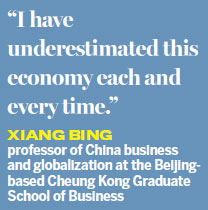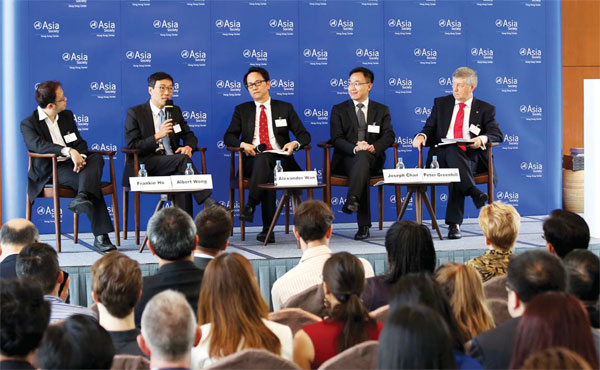Goodbye to cash and cards
Updated: 2016-09-23 08:02
By Anthony Warren in Hong Kong(China Daily Europe)
|
|||||||||
In China's developing smart economy, you can go out without a wallet but not your cellphone
China's Internet economy is changing. Retailers, consumers and payment services are moving beyond websites and credit-card transactions into the realm of an interconnected 'smart economy'.
The trajectory of this change - with consumers and financial institutions becoming increasingly entwined - was the focus of a China Daily Asia Pacific roundtable discussion held at the Asia Society Hong Kong Center on Sept 13. Panelists discussed the topic, Defining the digital era: China's smart economy.
|
At a roundtable event held in Hong Kong, on Sept 13, panelists discuss how consumers, businesses and financial institutions are adapting to the fast growth of China's smart economy. Parker Zheng / China Daily Asia Weekly |
Alice Mong, executive director of the Asia Society Hong Kong Center, said that as a Chinese-American, the fact that some 700 million mainland Chinese are connected to the Internet "gives you a context of what China is doing these days".
Such rapid growth sometimes makes it easy to overlook how young many Internet companies are. Google began in 1998 and Yahoo in 1994, while Baidu opened in 2000 and Xiaomi in 2010.
"It shows you how many of these companies have been around less than 20 years, especially those in China," said Mong.
Online development advancing at breakneck speed showed how the region was "setting the benchmark" for the new digital era.
Xiang Bing, founding dean and professor of China business and globalization at the Beijing-based Cheung Kong Graduate School of Business, may have better insight than most into the strengths of China's e-commerce and financial technology sectors. After all, one of the alumni from his school is Jack Ma, founder of Internet giant Alibaba.
Xiang said that having created his online empire, Ma returned to Xiang's college to recruit economics professors for roles in his companies. He did this not once, but twice.
For Xiang, the smart economy is just one of the sweeping changes that have washed over China in the past few decades. It is the economic prosperity and progress hinged on three "typhoons", he said, for "when typhoons blow even pigs can fly".
The first of these, Xiang said, was neoliberalism, which began in 1979 and influenced China's reforms of the 1980s. The second was the wave of globalization, including China's entry into the World Trade Organization in 2001. And the third "typhoon" was the introduction of the digital use, and democratization, of information.
For those nations that adopt and adapt global trends, he said, a shift to digital technologies has helped speed up economic restructuring.
"Despite all the arguments, I'll stick to my guns and be very optimistic about China's economic prospects," he said, admitting that whenever he thought differently he had been proved wrong.
"I have underestimated this economy each and every time," he joked.
When it comes to the digital economy, said Xiang, China certainly has advantages.

"The government has been promoting Internet Plus since 2014," he pointed out, adding that incentives have been used to promote the online sector.
"I think China is more ready than many other countries, despite huge challenges," he said. The country does not even need to seek innovation to drive growth, Xiang said, as the government has more options than ever before, including deregulation of sectors.
The mainland has a wealth of choices, but for Hong Kong a smart economy is a necessity, according to Albert Wong, CEO of the Hong Kong Science and Technology Parks Corporation.
"We need to do technology innovation in Hong Kong - not because we can do it, but because we have to do it," Wong said.
"I think the economy in Hong Kong, (if we are) honest with ourselves, is not doing too well. Technology is one of the keys to move us to the next step."
A government-funded organization, the Hong Kong Science Park hosts more than 600 innovating companies. As well as biotechnology and other fields, the organization is also involved in developing technologies to create a 'smart city'.
Despite the science park's good reputation among Hong Kong people, Wong said there is a concern that developments have not been promoted enough, even though some of the companies are "pretty cool".
Hong Kong can not deliver technological advances on its own, though, and partners are required. "Hong Kong is only so big," said Wong, "and not just physically."
With data playing a "huge part" in a viable smart economy, tapping into the cross-border ecosystem is important.
AsiaPay is in the business of using information across borders. Its founder and CEO, Joseph Chan, said that as an electronic payment service provider the company has worked with payment brands and merchants in Hong Kong, the Chinese mainland and elsewhere in Asia since 2000.
"A lot of the developments are in helping Asian merchants to provide more payment convenience to Chinese travelers and retailers," Chan said.
When Chinese e-commerce first took off, the businesses were focused largely on the manufacturing sector. But the shift to service industries and brand building has required Chinese companies to better understand the behavior of buyers, both at home and abroad.
The interconnectedness of the smart economy has helped in other areas.
Online platforms, for instance, offer payment in installments or on-the-spot personal loans. Such services that put users' entire financial experience in one basket are becoming a reality, said Chan.
Part of that drive for development has been fostered not just by the growing Asian economy but by more demanding customers, said Frankie Ho, general manager of Baidu International. The company is an online platform that offers online solutions to top-tier companies.
"E-business' greatest benefit is in data," Ho said, with the collection of economic data and information useful in building the knowledge of the user base.
Rather than developing new tools, Ho said, the big issue will be "how to move what we (already) have into the mobile landscape". It is about bringing developed markets directly into the hands of the cell phone or tablet user.
For the recently introduced system of payments using a mobile phone, some countries have used contactless methods - phones being "tapped" against a scanner. But China has gone one step further: Many payments can be sent at the touch of a button.
"In China, you can forget to bring along your wallet - but you need to bring your phone," said Ho.
Chan, the CEO of AsiaPay, agreed. "We're talking about a cash society to cashless, which is more like a plastic or card society," he said.
"And after that it's a cardless society. Right now, more and more people (in China) are using their mobile phones to tap and pay."
While most of the speakers generally had nothing but praise for the smart economy, Peter Greenhill, head of e-business at Equiom Group, a financial solutions company, offered a pragmatic view of its downsides - and an even more futuristic vision.
"The phrase smart economy has, unfortunately, been used to mean different things in different countries," Greenhill said. In his experience it was not a new idea - nor a one-off concept with a limited future.
The result will be lost jobs, he said, as bricks-and-mortar banks, travel agents and shops find customers head online. On top of that, there are issues governments and companies need to look at, from data privacy to money laundering.
"All of the smart changes people have been talking about, they're not completed," he said.
"Are they reshaping economies? Absolutely - just as they've done since at least the 1970s. But it's now at a much faster pace. It's accelerating all the time."
And if Greenhill is correct, these smart economy tools will eventually be viewed as "old and outdated".
He is working with innovators on the next generation of systems, using 3D and virtual reality to create unprecedented interconnectedness in everything from health to education.
As technology becomes increasingly borderless - and data moves freer and faster around the globe - the challenge is for Hong Kong and the rest of Asia to continually adapt and find roles in its development.
anthony@chinadailyapac.com
(China Daily European Weekly 09/23/2016 page29)
Today's Top News
ODI led for first time by private firms
Nanjing's culture and creativity on display in London
State of emergency declared in US city amid protests
Universities given boost in rankings
Demand for Mandarin rises in UK
China 'capable of keeping medium-to-high growth'
Li tells Obama of opposition to THAAD deployment
Greek vows to improve refugee situation on island
Hot Topics
Lunar probe , China growth forecasts, Emission rules get tougher, China seen through 'colored lens', International board,
Editor's Picks

|

|

|

|

|

|








